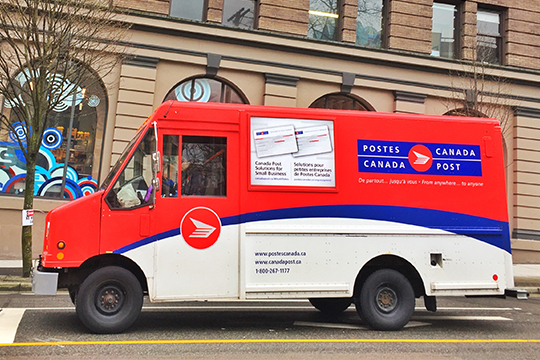
Members of the Canadian Union of Postal Workers (CUPW) voted yes recently to a proposed new contract extension with Canada Post. The original contract was imposed on these workers after back-to-work legislation forced an end to their previous struggle in 2018. After a coordinated campaign by the CUPW National Executive Board (NEB) to pressure workers to vote “yes”, without much if any forum provided for dissenting opinions to be expressed, the contract extension passed with a small majority voting in favour.
The results of the vote were released on Sept. 7, four days after the three-week voting period had ended. The NEB, who unanimously recommended members vote yes to renewing the current collective agreement, insisted on an unnecessarily complicated voting process. Citing the pandemic as a reason not to hold standard paper-and-ballot votes in the workplace (despite the fact that CUPW members have been working in these same unsafe job sites for the entire pandemic), voting sessions were instead held over a scheduled video conference meeting over Zoom. Each meeting featured a 10-minute pre-recorded video message from CUPW national president Jan Simpson giving an explanation of why members should vote yes to extending the contract—despite many of the concerns outlined in the 2018 strike going unaddressed, such as safety and overwork concerns, the effects of which were seen throughout the pandemic.
While many locals across Canada recommended their members vote “no” to extending the contract, it was up to the person conducting the meeting whether or not anyone could voice their opposition before the votes were cast. This meant that many rank-and-file workers reported that no opposition could be raised before votes were cast. Rural areas also expressed issues with accessibility regarding the voting process. Many rural workers found themselves unable to join the meeting in areas with unreliable internet connections. Members were told that they could instead call in their vote to their local union hall, but there was confusion among workers about whether or not these votes would end up being counted. Some workers reported being unable to reach anyone at the union hall at all. Clearly, the NEB worked to silence proper democratic debate and discussion.
The Urban Bargaining Unit of CUPW voted 66.3 per cent in favour of extending the contract, while the Rural and Suburban Mail Carrier (RSMC) Bargaining Unit voted 55.3 per cent in favour of extension. One of the big issues that will continue to go unaddressed will be the two-tier wage system, which pays more to the (mostly male) urban letter carriers than it does to the (mostly female) rural and suburban letter carriers.
That’s not to say that the urban workers had more incentive to vote yes, as the proposed two per cent wage increase won’t even match the rise of inflation in Canada, effectively making it a wage cut.
CUPW workers across Canada face overwork and unsafe working conditions. Management has expected the exact same level of production from their employees, despite requiring physical distancing and sanitization of their work stations. Mail volume rose over 50 per cent in 2020, and there were 181 straight days in 2020 where more than 1 million parcels were delivered. This led to incidents such as in January 2021, when more than 200 employees on one shift at the Gateway Processing Plant tested positive for COVID-19 with one employee dying after contracting the virus.
Local 730 in Edmonton was one of the many CUPW locals who supported a no vote. In a post-vote analysis, local president Roland Schmidt pointed out how the participation level in the previous contract extension vote in 2016 was 25 per cent, and considering the barriers, predicted that the detailed results would show far lower participation. His prediction was correct, as the detailed results were released on Oct. 6. A mere nine per cent of the Urban Bargaining Unit and 16 per cent of the RSMC Bargaining participated in this vote. The extremely low turnout rate shows the failure of the NEB in enthusing and including the rank and file in the democratic process of the union. No blame can be put on a rank-and-file individual worker when the leadership, as highlighted earlier, is actively silencing their voices and concerns.
These low turnout numbers show that the NEB has failed the rank and file and operated on the assumption that the members aren’t ready to fight. But how can you assume that members are not ready to fight when you actively silence them? How can you show the strength of a union when the rank and file is not enthused by its leadership and actively participating in discussion and decision making?
In a bulletin on the CUPW website outlining 11 reasons why members should vote yes, Jan Simpson said that the stability of keeping the same contract will provide job and income security and prepare members for the next round of bargaining in 2023. But keeping the same agreement will not improve the lives of CUPW members when inflation is rampant and we are facing a major economic crisis in this country and globally. Job and income security cannot be achieved by weakening the membership’s ability to think and make decisions. The NEB from the beginning should have waged a struggle against the Trudeau government’s back-to-work legislation in 2018 and condemned it by refusing to accept the continuation of the imposed contract in 2021.
CUPW members deserve a leadership that will allow the majority of the 50,000 workers to make decisions democratically and fight to win the best contract possible.
Dark clouds are gathering around workers across the country and postal workers will inevitably face further cuts and attacks on their living conditions. With this prospect, a fighting leadership needs to be built. CUPW activists with Fightback are working to build this leadership and we call on all postal workers reading this to join us in this task.

